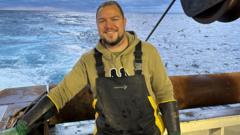The Arctic region has recently garnered attention as former President Donald Trump reignited discussions about acquiring Greenland, declaring national security interests and hinting at the territory's rich mineral resources as prime attractions. Amid this geopolitical backdrop, economic activities in the Arctic appear to have come to a standstill.
Fisherman Sondre Alnes-Bonesmo navigates the tough waters of the Arctic Ocean during grueling five-week tours aboard the factory trawler Granit. The harsh conditions of the Arctic winter, marked by frigid temperatures reaching below minus 40°C and near-total darkness, offer a striking contrast to the sun-lit summer fishing seasons. "I prefer it when the weather is nice; it's safer," he shares with a hint of humor.
Alnes-Bonesmo's experiences are part of an endeavor often referred to as the Arctic "cold rush," spurred by reports since 2008 that uncovered vast mineral and hydrocarbon reserves in the region. Climate change has further opened pathways, with shipping distances in Arctic waters doubling between 2013 and 2023. The prospect of developing efficient shipping routes from Asia to Europe through these waters seems plausible.
However, following Russia's invasion of Ukraine in 2022, plans for Arctic economic development encountered significant setbacks, particularly affecting international shipping and resource exploration. Morten Mejlaender-Larsen from Norwegian firm DNV points out that the hoped-for shipping expansions in the Northeast Passage have drastically diminished due to geopolitical animosities.
Norway, which previously harbored great ambitions for Arctic exploration, is now cautious, having paused oil and gas pursuits in the region. Environmentalist sentiments have spurred these changes in policy. For instance, Greenpeace welcomed the Norwegian government's decision to halt deep-sea mining licensing off its coast, highlighting concerns over ecological impacts.
Helene Tofte of the Norwegian Shipowners Association elucidates that even with the effects of climate change, the Arctic remains a perilous environment for shipping. The region demands massive investments in emergency preparedness and infrastructure that current stakeholders find commercially unviable.
Prof. Arild Moe from the Fridtjof Nansen Institute critiques the overly optimistic projections of the Arctic's resource wealth, pointing out that promises of oil and gas reserves stemmed from speculative reports rather than concrete findings. To characterize Trump's interest in Greenland, he notes that the former president's remarks reflect both a pursuit of economic opportunities and a strategic military interest, which has elicited swift responses from Denmark and Greenland asserting that the territory is not for sale.
In contrast to Trump's ambitions, Canada continues to develop its northern territory, building a significant deep-water port at Grays Bay, central to the Northwest Passage. As for Alnes-Bonesmo, he reflects on his journey through the Arctic’s harsh beauty and fragility. Despite profitable endeavors, he understands the shrinking fishing quotas aim to conserve fragile marine ecosystems, leading him to approach both the ocean's danger and splendor with deep respect.





















